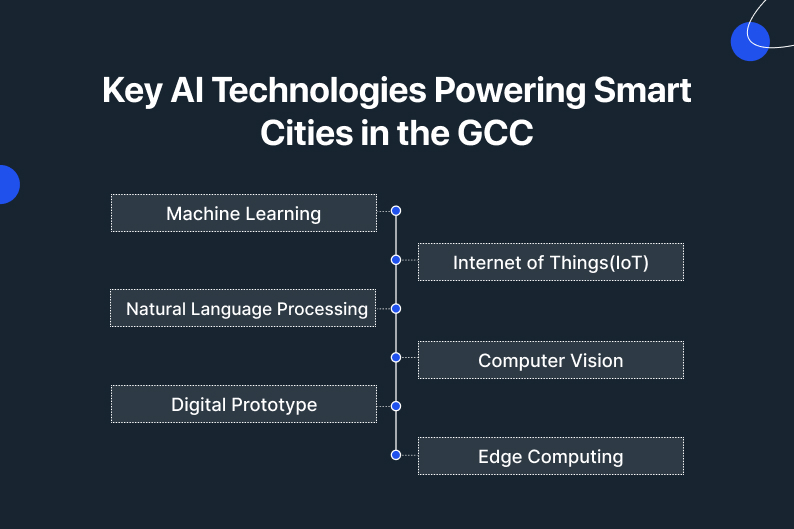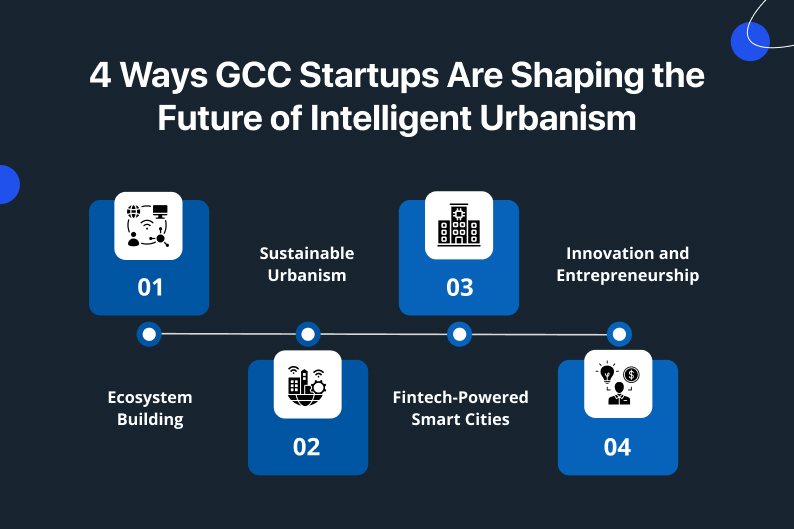Ever pictured yourself entering a city where the horizon shimmers with skyscrapers, driverless cars speed along smart roads, and autonomous traffic systems react to pedestrian traffic in real-time?
Luckily, this is the emerging reality of the GCC (Gulf Cooperation Council) countries. AI smart cities in the GCC are remodeling traditional spaces into intelligent urbanism.
Feels too good to be true, right? So, let's get practical. Artificial intelligence solutions, Dubai help predict and prevent accidents at intersections to shrink the response times for ambulances. In Riyadh, traffic systems help reduce congestion to cut commute times.
The UAE and Qatar are utilizing AI models to balance smart energy grids that can balance the demand of solar and wind energy efficiently.
The gears of intelligent urbanism are turning fast in GCC countries. In this blog, we’ll explore the technologies redefining urban AI solutions in the GCC, their practical use cases, and the changing shape of smart cities by GCC-born startups.
Which Artificial Intelligence Technology Powers These Smart Cities?

The mastermind behind the success of AI innovation in the Gulf is a fusion of advanced technologies working together for digital harmony. These intelligence systems comprise:
-
Machine Learning
Machine learning assists these cities in comprehending patterns and predicting future behaviors, whether it’s traffic congestion, water consumption, or energy demand.
These intelligent systems don’t just react, they foretell.
-
Internet of Things(IoT)
IOT in urban development UAE serves as a nervous system, it accumulates information from multiple devices and sensors to process real-time information from streets, buildings, and infrastructure.
-
Natural Language Processing(NLP)
Natural Language Processing breaks down the barriers to access. With the help of NLP virtual assistants and chatbots, these systems interact with residents fluently, supplementing the idea of intelligent urbanism.
-
Computer Vision
Computer vision enables AI systems to access surveillance systems and identify incidents in real time to provide actionable steps for law enforcement or emergency responders.
-
Digital Prototype
Digital prototyping assists in replicating city zones. City planners apply these prototypes in testing policies and modeling changes without any real-world repercussions.
-
Edge Computing
Under edge computing, smart devices, such as parking sensors or cameras, automatically make decisions without sending data to the cloud. This lowers latency and the additional time used by data to travel across multiple systems.
Where Can You See Practical Usage of AI Technologies in GCC Countries?
Initiatives like NEOM in Saudi Arabia and Masdar City in the UAE testify to the active role of AI in smart and sustainable city development. Here are some practical use cases of urban AI solutions in the GCC:
-
Infrastructure in Smart Cities
Gulf cities are heavily reliant on AI technologies like IoT and big data for city traffic management, energy efficiency, and public safety. AI-Powered Solutions Dubai is a prime example, with systems that actively monitor road conditions and help predict traffic flow to reduce congestion.
AI-driven solutions prove to be worthwhile in urban planning, reducing congestion, and improving sustainability.
-
Healthcare Systems
AI systems in the healthcare industry assist in predictive analytics, telemedicine, and personalized treatment plans.
UAE and Saudi Arabia are powering through by leveraging AI into diagnostics, patient care, and medical research. AI for healthcare in the Middle East is set to create benchmarks for advanced patient care.
-
Energy and Sustainable Development
Well known for their dependence on oil and gas, Gulf countries' shift to AI systems proves to be beneficial in optimizing the flow of resource extraction, reducing carbon footprints, and improving the process of energy conservation.
For sustainable development, AI systems plan and execute the distribution and consumption of electricity, assist in reducing energy wastage, and build adaptive resource storage solutions.
-
Finance and Banking
Financial institutions in the Gulf are incorporating AI in fraud detection, risk assessment, and customer support automation. AI-driven fintech solutions are strengthening digital payments, investment strategies, and personalized banking experiences.
Blockchain-driven AI solutions are streamlining the flow of information in financial markets, with risk assessment tools forecasting economic trends.
-
Public Services
GCC governments are way ahead in the game of AI-integration, these AI tools assist in urban planning, predictive maintenance systems, and security management.
These systems prove to be worthy not only in public service delivery but also in cost savings and operational efficiency.
Wish to witness the transformative power of artificial intelligence across Gulf businesses? Check out how AI development services continue to reshape Gulf industries in 2025.
How Are GCC Startups Changing the Game of Intelligent Urbanism?

It’s not just the GCC governments leading the change, startups are set to prove AI innovation in the Gulf.
What’s the role of GCC startups in the smart city initiative? Let’s investigate:
-
Ecosystem Building
Through programs like innovation hubs, GCC governments aim to develop startup ecosystems and draw in talent and investment.
Startups in the GCC are concentrating on building cutting-edge technological solutions to receive investments from venture capital and private equity firms.
-
Sustainable Urbanism
GCC startups are developing AI solutions for smart cities, including smart systems for urban planning, autonomous transportation, and energy optimization.
These startups have a growing focus on sustainable urban development, with a focus on renewable resources, waste, and smart grid management.
-
Fintech-Powered Smart Cities
Statista shows that the UAE hosts 550+ fintech firms, with nearly 10% being new-age startups. In light of this, GCC startups are leveraging digital technologies such as blockchain, machine learning, and IoT to transform AI-driven smart cities in the GCC into fintech-powered hubs.
AI in urban development UAE is utilizing offshore AI resources to accelerate these strategies and develop innovative use cases.
-
Innovation and Entrepreneurship
GCC startups are helping governments to diversify their economies, ultimately reducing the dependency on oil. This innovation is powered through incubators and accelerators, fostering innovation and the development of new technologies.
The rise of generative AI development Abu Dhabi sets the base for next-gen technologies. From automating creative processes to accelerating R&D in energy sectors, Abu Dhabi is quickly becoming a hub for generative AI breakthroughs.
The Next Big Step
The GCC’s path to intelligent urbanism goes beyond AI integration, it aims to redefine how people live, move, and interact with their cities.
From improving infrastructure to customizing public services, artificial intelligence is establishing the foundation for a more responsive, sustainable, and interconnected urban future. Needless to say, such smart cities deserve smart partners that can redefine the future of urban living.
At Infutrix, we are prepared and enthusiastic to contribute to this futuristic evolution by delivering AI-driven business intelligence GCC solutions that empower GCC countries to become truly ‘smart’.













